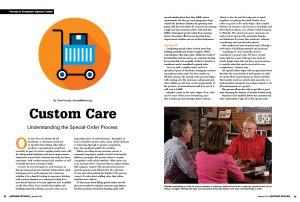Click the image above to view a full PDF.
One size does not always fit all. Sometimes a customer’s needs are so specific that nothing other than a product so specialized it would not normally be part of a store’s regular product mix will do. Independent hardware and home improvement businesses across North America are ready for these customers, with workers trained and vendors on call to handle the most exacting of tasks.
So how do you best improve your business in this growing and precise market? Independent retail businesses serve as the gateway for customers, whether it be a family looking to renovate a kitchen with custom cabinets or a customer looking for a new faucet that has to be just right but isn’t available on the show floor. Even outside the lumber and building materials industry, special orders are an important piece of retail business. Examples of how to handle custom orders, from client relations to following through to project completion, have far-reaching benefits for retailers.
While providing strong customer service is extremely important, equally crucial is having the ability to promptly fill special orders to remain competitive with online retailers. What value can your store provide a customer that an online retailer, like Amazon, cannot? The special-order process must be painless and efficient for the customer. It’s not just about getting the details of the process correct; it’s also about adding value that online retailers can’t deliver.
To learn more about filling special orders and the processes needed to maintain customer expectations for these products, Hardware Retailing spoke with several retailers about how they fulfill custom requirements. We also got some perspective from outside the hardware industry by speaking with pastry chef Ron Ben-Israel. He is known for running a high-end cake business in New York City that fulfills extravagant special orders from exacting clients. Ben-Israel offered some tips that home improvement retailers can use in their businesses.
Starting Off
Completing special orders is about more than building materials and lumber supplies. While customization often takes place within the world of homebuilders and renovators, any customer looking for an item that isn’t normally stocked or found in a warehouse can be considered a special order.
Yet even with a smaller order, such as a specialized piece of hardware, managing customer expectations starts early. For Star Lumber in Wichita, Kansas, the special-order process begins with making sure the customer, salespeople and other staffers are all clear on the requirements of the product, its measurements and how much it will cost to fulfill.
Mistakes made in the early stages of an order can be some of the most devastating, says Star Lumber general manager Brian Schawe, which is why he and his team put so much emphasis on getting the small details of an order on point in the early stages. Star Lumber features an extensive showroom in its Maple and West Street location, one of three retail locations in Wichita. The showroom gives customers an early look at options like materials, finishes and hardware for items like windows, cabinets, countertops and special-order paints.
Star Lumber has nine locations total, offering a wide array of building materials and products. “Anything we don’t normally stock is considered a special order. We have several teams that are a part of the process, from an inside design team that can draw up renovations to outside sales that can be involved in new construction,” Schawe says.
All special orders begin with an agreement sheet that lists the exact details of each project or order. To ensure these requirements are listed correctly, Star Lumber sends an outside sales associate or a trusted partner among its renovation contacts to do all measurements on a project.
This process allows the order to get off to a good start, lessening the chances of mistakes further along. Payment is also handled before the customer and sales representative sign off on the special order. For Star Lumber, payment is usually determined by how often the customer has ordered through the business and the type of order. Cash orders typically require full payment up front, as do other orders that cannot be feasibly repurposed, such as custom paint mixes.
“There’s a line on each ticket, saying ‘S.O. Agreed.’ That stands for ‘Special Order Agreed,’ and it has to be signed off before any order is put through. Once you have everything from the color, the type of product, the style and the manufacturer, you sign off on that,” Schawe says. “It can really be anything, from a gallon of paint to 50 gallons, if it’s custom mixed that’s not something we resell, so we ask for full payment beforehand.”
Get a Good Look
Another way to avoid mistakes is a site visit by a salesperson or trusted partner to a contractor’s or builder’s location. Mawson Lumber and Hardware in Fort Collins, Colorado, does the majority of its business with builders, often on historical buildings and homes that require great care when finding authentic materials or finishes.
When a builder is looking to begin work, a Mawson employee will often visit the job site and take pictures along with measurements. These photos help determine which vendor or mill to use for the job, general manager Mike Fees says.
“Before we do the bid process, we do a site review and get as much information as possible. We had a recent order that came from a contractor switching yards, and the reason was the other yard was putting in the measurements wrong. These custom orders carry a high price tag, so we need to make sure these numbers are accurate from the start,” Fees says.
Vendor Value
Managing customer expectations and delivery needs go hand in hand when dealing with vendors, distributors and other professionals who can create or procure the products customers demand. Each step along the way, retailers must maintain contact with these specialized professionals to make sure ordering, manufacturing and final production are all in sync.
Methods for developing a strong network of vendors can vary. Star Lumber employs a centralized purchasing center that streamlines the bidding and ordering process, with individual salespeople who can call on their trusted contacts depending on what is required in the order.
“Having individual buyers gives us great access when going through the pricing process. A salesperson can reach out to a buyer with our centralized purchasing to make sure a customer is getting the correct price the first time. We serve as the resource to find the right product,” Schawe says. “We engage our salespeople with a lot of vendor training to keep them current on product assortments and abilities. They have the right knowledge to help that DIY customer make the right choice for their project.”
Mawson Lumber and Hardware’s connections come from years of experience in the market. From pre-internet methods like cold calls and old-school word of mouth, persistent searching has yielded Fees a network of connections to mills and manufacturers that can source the kind of specialized materials his customers are looking for.
“Especially for some of my older contacts and builders, they don’t want to take no for an answer even though some of these materials are rare finds. I don’t want to come up empty, because they’ll go somewhere else, find it, and think ‘Mawson must not have worked very hard.’ Those kinds of associations can quickly become problems,” Fees says.
Training Time
Another connection point concerning vendors is training for retail employees. Star Lumber keeps its sales force continually trained on its product selection via vendor-supplied training sessions and keeps its staff up to date on the latest changes in the products available.
“As a company, you have to stand behind that product and stand behind your work with a customer. If you have a good rapport with the client and the vendor, you can turn mistakes into good conclusions. Mistakes will happen, but if you leave both sides pleased, they’ll be there in the future,” Schawe says.
Many factors can play into deciding on a vendor to supply an order. Factors to consider, along with price, are turnaround time and specialties of vendors in question. Fees and Schawe both emphasized the selection of vendors based on deadlines involved, not on price. Since custom orders can sometimes have higher average price points than typical transactions, the focus should be on ensuring quality materials and timely delivery.
Delivery Done Right
The final step for many special orders on the customer side is delivery, whether delivering to a work site or shipping to a store or the customer’s home. With online retailers offering convenience and speed in getting products into the hands of customers, retailers must match that ability.
To ensure accuracy and accountability during its delivery process, Star Lumber uses equipment that allows drivers to take pictures of each delivery and track it along its route from the warehouse to the truck and then at the delivery location. Having photos ensures a record of delivery that can avoid or mitigate any issues once the product is delivered.
Mawson puts particular emphasis on delivering to sites while a contractor is working. Supplies needed to complete the first floor are delivered to the site, excess from that project is picked up, then the supplies for the second floor are delivered. This process keeps supplies from being damaged by the weather and keeps job sites clear of excess materials, which Fees says his customers appreciate.
The delivery experience often comes down to the smallest details, says Mawson Lumber and Hardware owner Scott Glasscock. Drivers often have instructions to drop materials off at specific locations in a job site or at a home build and will be re-dispatched to a delivery site if it’s not dropped where it’s needed.
“These are high-dollar, custom-made products. We take it all the way, including making sure our delivery drivers are equipped with clean gloves so as not to leave fingerprints on the finishes,” Glasscock says.
Nothing, not even fingerprints, is too small when it’s special.
Piece of Cake … Right?
You won’t find too many similarities between the day-to-day world of hardware retail and custom pastries, but fulfilling customer expectations and making timely deliveries of products spans across both industries. Ron Ben-Israel has designed cakes for celebrities and events across the world, while his expertise was on display as host of the reality cooking competition “Sweet Genius,” which aired on Food Network from 2011 to 2013. He also appears as a judge on many other series and specials on that channel as well.
To gather insight from beyond the hardware industry,
Hardware Retailing spoke to Ben-Israel about accomplishing custom orders, handling customer expectations and making
the most of the client experience. Take a look at our tips on how his approach can help better your business’s operations.
Hardware Retailing (HR): How do you begin a cake design?
Ron Ben-Israel (RBI): We begin with referrals for our clients. We do social media work, but we don’t advertise in the conventional fashion. For our industry, our referrals comes from clients seeing our work at fundraisers, openings, promotions, weddings or other events. One of our big causes is fighting hunger, so we do a lot of events for causes and organizations.
We begin a vetting process to understand the dates involved as well as the expectations of the client, which determines its cost. Once we’ve determined that a customer’s date and design expectations can be fulfilled, we invite them in for a tasting.
I’m happy to recommend colleagues of mine if we cannot accommodate a client. That’s part of good business, and we want even clients we don’t work with to leave happy.
Hardware Tip: While retail businesses must compete for every sale, forming strong customer connections can sometimes be more important in the long run. If a customer’s project or order would fit better with another retailer, recommending that business can form positive associations for the customer.
HR: What are some of the most common issues when creating custom cake designs?
RBI: Expectations and knowing the smallest details of a client’s mind when crafting a design. One example can be a client wanting a certain shade of frosting, like magenta. We can’t go off of just a color’s name; we need a Pantone number or paint swatch in order to make sure that color translates to the final design.
One time I wrote in a cake contract to decorate the cake with linking diamonds and lace. So we designed the frosting to mimic diamonds and lace. The design is finished and it looks magnificent, and we speak to the client afterwards. They were happy, but they asked, “Where were the diamonds?” I guess they thought we’ll use real diamonds in the design. I said, “This was an expensive cake, but not that expensive!” We learned to avoid misunderstandings and learn from those mistakes.
Hardware Tip: Details, details, details! Assuming that you and a customer are on the same page is how small misunderstandings become big headaches.
HR: What are some of the things you focus on when determining price?
RBI: So much goes into a design, because everything we work with is from scratch. Even the price of ingredients fluctuates, so there are many variables to consider.
We offer a customized experience, and clients wanting that experience have a certain expectation. I like to say to people, you get what you pay for. We are proud of our original designs, and our people are highly skilled. Customer attitudes are shifting to appreciate that, and a reputation of quality for a small business is more important every day.
Hardware Tip: Special orders, by definition, have a tendency to come with a larger price tag, which puts an emphasis on delivering exactly what is required and with the highest level of service.
HR: What are your keys for creating positive customer interactions?
RBI: Sometimes you start a design and realize something isn’t going to work. Sometimes fewer people RSVP to an event than you anticipated. One time, a cake was designed to match the bride’s dress, which she kept changing, meaning we had to alter the final color several times.
People have good and bad days. It happens with any merchant, and that’s why we have contracts that specify what the client should expect. Our job is to make the client feel good and be happy. Anyone working with customers knows this—that it’s important to make adjustments to satisfy.
It’s nice when people call you an artist—but we’re in the service industry. We’re selling goods. We’re mindful of that. No matter the superlatives, the cake has to speak for itself.
Hardware Tip: At the end of the day, your business is there to solve a problem. Whether it be supplying the materials for a home remodel or a hammer that is only stocked on the other side of the country, delivering on promises and working with a customer to complete the project are some of the best ways to build repeat business. Make sure customers walk out satisfied and they’ll be back through your doors.
 Hardware Retailing The Industry's Source for Insights and Information
Hardware Retailing The Industry's Source for Insights and Information







